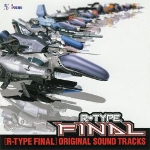R-Type Final Original Soundtrack
 |
Album Title: R-Type Final Original Soundtrack |
| Record Label: Scitron Digital Contents |
|
| Catalog No.: SCDC-00288 |
|
| Release Date: August 20, 2003 |
|
| Purchase: Buy at CDJapan |
Overview
In 2003, Irem released the not-so-ultimate R-Type Final for the PlayStation 2 to moderate reception. The company outsourced the music production to Wavelink Zeal’s Yuki Iwai, who had previously worked on numerous Capcom fighting games. The composer took the series’ scores in a new direction after the highly exuberant approach of R-Type Final, focusing on conveying atmosphere rather than entertaining listeners.
Body
The themes for the first stage reflect the sort of music to be expected from the soundtrack. All tend to focus on conveying industrial imagery using ambient synthpads and sinister beats. While the majority of such themes do complement the visuals in an understated way, they’re absolutely underwhelming on a stand-alone level. The tracks have no hooks to speak of, feature little to no development, and are styled in a mundane and derivative way. This is a major contrast to the R-Type Delta soundtrack, which managed to be dark and moody while offering plenty of fascinating features to immerse soundtrack consumers. In contrast, this music just leaves a bad taste in my mouth out of context.
Focusing on the contextual experience, Yuki Iwai takes a more interactive approach on the soundtrack R-Type Final. Whereas past R-Type soundtracks usually adopted the approach of ‘one theme per stage’, Iwai offers multiple themes for each stage in R-Type Final. This allows the soundtrack to constantly represent the game’s diverse environments, whether capturing the build-up towards the boss encounter in the opening stage, the journeys through diverse environments in the second stage, or the exploration of a deserted laboratory during the sixth stage. For the most part, Iwai also succeeds in offering stylistic and thematic links between the themes, ensuring that the shifts are generally subtle and cinematic ones. In this sense, the soundtrack is a progression on previous additions to the series.
While this is all good from the perspective of the game, the numerous substage themes only emphasises the tedious quality of the soundtrack on a stand-alone level. The different environments in the second stage are portrayed in a contrasting ways — with crickets chirping and wind blowing for the desert, industrial and ethnic percussion for the air, and underwater synth effects for underwater — but this doesn’t make the stereotypical and unmelodic individual tunes any more interesting. Likewise, the tracks for the deserted lab do capture the anticipation of the spiral pathway, danger of the enormous cistern, and heroism of the boss encounter. However, the typical stylings and unmemorable features make these tracks tedious rather than immersive on a stand-alone level. Frankly, I would have it if Iwai focused on making one masterpiece composition, rather than multiple mediocre ones.
Despite most of the soundtrack being unappealing, there are a few more appealing themes on the soundtrack. For example, the intense scenes of a battleship raid during stage three are captured with sinister organ and choral components; they could be more memorable, but still feel more substantial than the rest of the material here. Two of the stage six themes are also impressive, “Beautiful Erasure” and “Anti-Space”, with their varied soundscapes and clever manipulations. These tracks feel more in line with the creative approach of the R-Type Delta soundtrack. Furthermore, “The Bydo…” for Stage F is an ominous industrial theme that transcends the others by being both contextually effective and melodically memorable. The overall soundtrack would be much more appealing if more tracks sounded like this.
The boss themes are also among the more enjoyable tracks here, following the tradition of R-Type Delta. “Boss (Biological)” is an intense electronic theme with some sinister tones. It doesn’t do much melodically, but the beats are intense and the ominous synth really helps add a sense of urgency and tension into the mix. On the other hand, “Boss (Mechanical)” features a drum and bass sound, similar to something you might hear from k.h.d.n. The haunting vocal samples go well with the frenetic percussion work, and although it isn’t as intense as “Boss (Biological),” it manages to create a compelling atmosphere for a battle with a powerful enemy. Lastly, “Boss (Final)” is quite different from the other two. It is an ethereal, mysterious theme that opens up with some ominous choral work before moving into a very surreal sort of synthesizer atmosphere with some occasional vocal samples thrown in the background.
The album release concludes with a bonus medley arranged by Takayuki Aihara for Scitron Digital Contents. The track captures the essence of the R-Type franchise perfectly with its industrial beats, choral elements, funky melodies, and dramatic shifts. Aihara places the focus on the first stage themes from the R-Type and R-Type II, both of which are similarly styled; he brings a new level of appeal to their original melodies in conjunction with the ethereal and elevated trance-inspired stylings. The track nevertheless encompasses quite a bit in the sections beyond that, including a sleek homage to R-Type Leo, a bittersweet synthesizer solo around the two minute mark, and a humorous retro voice sample saying “3. 2. 1. Let’s Go”. Overall, a very enjoyable bonus in an otherwise lacklustre soundtrack.
Summary
The direction that Yuki Iwai took for R-Type Final certainly complemented the product’s visuals and gameplay. However, most tracks are simply too ambient and repetitive to be worth listening to on a stand-alone basis. A few tracks are enjoyable and the classic medley is a big plus, but there’s nothing here that most should spend cash on.
Do you agree with the review and score? Let us know in the comments below!
2
Posted on August 1, 2012 by Don Kotowski. Last modified on August 1, 2012.














